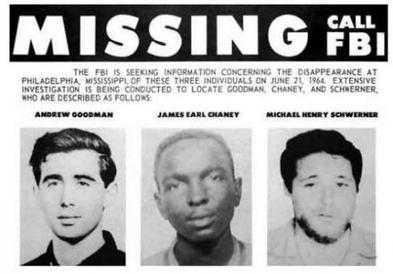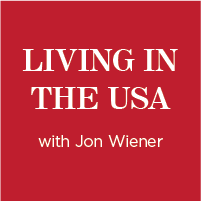 LISTEN online HERE — iTunes podcast HERE
LISTEN online HERE — iTunes podcast HERE
The folly of continuing the American war in Iraq: JOHN NICHOLS says Obama’s new bombing campaign there raises the very real danger of “US mission creep in Iraq and escalation into a larger conflict” – when even Obama admits that “there’s no American military solution to the larger crisis in Iraq.” John is Washington correspondent for The Nation.
 Plus: To celebrate the 40th anniversary of Nixon’s resignation, we feature JOHN DEAN—he spent the last four years listening to 600 taped White Houe conversations no one else had heard. Now we can tell the full story of what Nixon knew about the break-in and the coverup, and when he knew it. John’s new book is THE NIXON DEFENSE: What He Knew and When He Knew It.
Plus: To celebrate the 40th anniversary of Nixon’s resignation, we feature JOHN DEAN—he spent the last four years listening to 600 taped White Houe conversations no one else had heard. Now we can tell the full story of what Nixon knew about the break-in and the coverup, and when he knew it. John’s new book is THE NIXON DEFENSE: What He Knew and When He Knew It.
 Also: Outlaws of the Atlantic: historian MARCUS REDIKER talks about pirates, protest and vengeance in the 18th century: life for “motley crews” in the seas’ unreal space, and the sailors’ yarns that spread the news of revolts and uprisings. Marcus teaches at the University of Pittsburgh; his new book is Outlaws of the Atlantic.
Also: Outlaws of the Atlantic: historian MARCUS REDIKER talks about pirates, protest and vengeance in the 18th century: life for “motley crews” in the seas’ unreal space, and the sailors’ yarns that spread the news of revolts and uprisings. Marcus teaches at the University of Pittsburgh; his new book is Outlaws of the Atlantic.
Edward Snowden and Glenn Greenwald: KPFK 7/30
 LISTEN online HERE — iTunes podcast HERE
LISTEN online HERE — iTunes podcast HERE
Today we feature one of Edward Snowden’s lawyers – JAMEEL JAFFER, he heads the ACLU’s Center for Democracy, which houses the organization’s work on national security, free speech, privacy, human rights, and technology. He went to court to challenge the Patriot Act’s “national security letter” provision, the Bush administration’s warrantless wiretapping program, and the National Security Agency’s call-tracking program. He’s the guy who won the release of the Bush administration’s “torture memos.”
 Also: SUE HALPERN talks about Glenn Greenwald and his critics–she’s a regular contributor to The New York Review and editor of NYRB Lit–and she’s a scholar-in-residence at Middlebury. She wrote about Greenwal’d book “No Place to Hide” for the New York Review: HERE.
Also: SUE HALPERN talks about Glenn Greenwald and his critics–she’s a regular contributor to The New York Review and editor of NYRB Lit–and she’s a scholar-in-residence at Middlebury. She wrote about Greenwal’d book “No Place to Hide” for the New York Review: HERE.
“This Nonviolent Stuff’ll Get You Killed”: KPFK 7-16
 LISTEN online HERE — iTunes podcast HERE
LISTEN online HERE — iTunes podcast HERE
CHARLES COBB was a SNCC Field Secretary in Mississippi during Freedom Summer in 1964 – he’s also been a visiting professor at Brown University, and his reporting has won many awards. His new book is This Nonviolent Stuff’ll Get You Killed: How Guns made the Civil Rights Movement Possible.
Plus: The wonderful novelist JONATHAN LETHEM talks about Communists in Queens in the 1950s, Hippies in the Village the 1960s, and the Occupiers of two years ago – all in his novel Dissident Gardens—it’s out now in paperback.
 Also: CHARLIE LEDUFF had a dream job as a reporter for the New York Times in LA—but he quit in 2007 to return to his home town of Detroit and work for the local paper there reporting on what was happening to that city. His book is Detroit: An American Autopsy.
Also: CHARLIE LEDUFF had a dream job as a reporter for the New York Times in LA—but he quit in 2007 to return to his home town of Detroit and work for the local paper there reporting on what was happening to that city. His book is Detroit: An American Autopsy.
KPFK 7/9: Preempted
for the record: the 7/9 show on KPFK was preempted for “The People’s Game,” KPFK’s special World Cup coverage.
Laurence Tribe on Hobby Lobby: KPFK 7/2
 LISTEN online HERE — iTunes podcast HERE
LISTEN online HERE — iTunes podcast HERE
The Supremes and the Hobby Lobby ruling on the “religious freedom” of corporations: we’ll have comment from LAURENCE TRIBE, he’s taught constitutional law at Harvard for 40 years, and he argued Bush v. Gore at the Supreme Court. His new book is UNCERTAIN JUSTICE: The Roberts Court and the Constitution.
 Plus: Gay marriage is legal in more states every day. Does that mean the LGBT equality movement is almost over? REBECCA ISAACS says marriage equality “will not make our streets and our communities safe and free from violence. It will not make our military, our prisons, our immigration system, or our healthcare inclusive and just.” Rebecca is executive director of the Equality Federation and writes for The Advocate.
Plus: Gay marriage is legal in more states every day. Does that mean the LGBT equality movement is almost over? REBECCA ISAACS says marriage equality “will not make our streets and our communities safe and free from violence. It will not make our military, our prisons, our immigration system, or our healthcare inclusive and just.” Rebecca is executive director of the Equality Federation and writes for The Advocate.
.
Also: LALO ALCARAZ is an artist, writer, and author of the comic La Cucaracha, the first nationally syndicated, politically themed Latino daily comic strip: now Lalo has a new book out—his third: A Most Imperfect Union, a “contrarian history of the US,” co-authored by Ilan Stavans. Lalo also hosts KPFK’s “Pocho Hour of Power.”
The End of Iraq? Juan Cole on KPFK 6/25
 LISTEN online HERE — iTunes podcast HERE
LISTEN online HERE — iTunes podcast HERE
JUAN COLE has studied Muslim politics and history for 30 years, and now he says Iraq is “in its last throes” as Kurdistan prepares to declare independence and the Sunnis allied with ISIS consolidate their control.
Plus: 50 years ago, Mississippi Freedom Summer brought a thousand mostly white college students to the worst place in America; what happened that summer changed history. MARSHALL GANZ dropped out of Harvard to go to Mississippi, where he found his “calling” as an organizer for the Student Nonviolent Coordinating Committee. Then he spent 16 years organizing alongside Cesar Chavez. He’s still working on community organizing, and he also teaches at Harvard’s Kennedy School.
Also: Also: A spiritual journey into the Himalayas: PICO IYER talks about Peter Mattheson’s exploration of suffering, impermanence, and beauty in his classic book The Snow Leopard – it’s out now in paperback.
Mississippi Freedom Summer, 50 Years Later: KPFK 6/18
 LISTEN online HERE — iTunes podcast HERE
LISTEN online HERE — iTunes podcast HERE
On the 50th anniversary of Mississippi Freedom Summer, we will revisit the project that brought a thousand mostly white students from the North to teach in Freedom Schools and work on voter registration – the summer that began with the murders, 50 years ago on June 21, of Mickey Schwerner, James Chaney and Andrew Goodman. DAVE DENNIS was there – he was head of CORE in Mississippi in the early 1960s, and he spoke at James Chaney’s funeral.
Plus: TOM HAYDEN on the climax of Mississippi Freedom Summer, when the Freedom Democratic Party challenged the Democratic National Convention in Atlantic City in 1964.
 And we will look at the movement in Mississippi today: JED OPPENHEIM will talk about the legacy left by Chokwe Lumumba, the radical mayor of Jackson who died in February—his movement was based on people’s assemblies and “a solidarity economy.” Jed is the Advocacy coordinary for the ACLU of Mississippi, and serves on the Jackson Public Schools Board, where he was appointed by Mayor Chokwe Lumumba.
And we will look at the movement in Mississippi today: JED OPPENHEIM will talk about the legacy left by Chokwe Lumumba, the radical mayor of Jackson who died in February—his movement was based on people’s assemblies and “a solidarity economy.” Jed is the Advocacy coordinary for the ACLU of Mississippi, and serves on the Jackson Public Schools Board, where he was appointed by Mayor Chokwe Lumumba.
The College Tuition Spiral: KPFK 6/11
 LISTEN online HERE — iTunes podcast HERE
LISTEN online HERE — iTunes podcast HERE
TOM FRANK reveals the three-decade scheme to raise tuition, bankrupt generations, and hypnotize the media. Tom writes for Salon.com.
Plus: RICKY JAY is one of the world’s great sleight-of-hand artists, distinguished by the remarkable variety of his accomplishments as an author, actor, and historian. In Jay’s Journal of Anomalies he describes some of his favorite strange entertainments through the ages.
 Also: What are your 54 favorite films? We’ll ask KENNETH TURAN, film critic for the LA Times—his new book is Not to be Missed: 54 Favorites from a Lifetime of Film. We’ll talk about “Kiss Me Deadly,” “Touch of Evil,” “Vertigo” — and Lars Von Trier’s “Five Obstructions.”
Also: What are your 54 favorite films? We’ll ask KENNETH TURAN, film critic for the LA Times—his new book is Not to be Missed: 54 Favorites from a Lifetime of Film. We’ll talk about “Kiss Me Deadly,” “Touch of Evil,” “Vertigo” — and Lars Von Trier’s “Five Obstructions.”
‘We Kill People Based on Metadata’: KPFK 6/3
 LISTEN online HERE — iTunes podcast HERE
LISTEN online HERE — iTunes podcast HERE
“We kill people based on metadata,” a former head of the NSA told DAVID COLE. Can the NSA be controlled? David will comment — he teaches law at Georgetown, he’s legal affairs correspondent for The Nation and writes also for the New York Review.
.
![]() Plus: $1 Billion to restore the LA River: LEWIS MacADAMS, founder and president of Friends of the LA River, will explain the historic victory that was announced last week—11 miles of the concrete flood channel of the river will be ripped out, from Griffith Park to downtown.
Plus: $1 Billion to restore the LA River: LEWIS MacADAMS, founder and president of Friends of the LA River, will explain the historic victory that was announced last week—11 miles of the concrete flood channel of the river will be ripped out, from Griffith Park to downtown.
Also: Maybe you heard: yesterday was primary election day in California. we’ll have our political postmortem with HAROLD MEYERSON of the American Prospect and the Washington Post.
Rebecca Solnit: ‘Men Explain Things To Me.’ KPFK 5/28
 LISTEN online HERE — iTunes podcast HERE
LISTEN online HERE — iTunes podcast HERE
What goes wrong in conversations between men and women: REBECCA SOLNIT explains. She writes for TomDispatch and Harper’s and the London Review of Books; her new book is Men Explain Things to Me.
.
Also: The CIA has done many bad things, but it had one agent who might have brought some justice to the Palestinians: Robert Ames. KAI BIRD, a Pulitzer-Prize winning author and contributing editor of The Nation, talks about THE GOOD SPY: The Life and Death of Robert Ames.

Plus: China is the biggest story of the century : why does a government with more success lifting people out of poverty than any other civilization in history operate in such a repressive and dictatorial way? EVAN OSNOS will explain – he’s been The New Yorker’s China correspondent, and his new book is Age of Ambition: Chasing Fortune, Truth and Faith in the New China.
